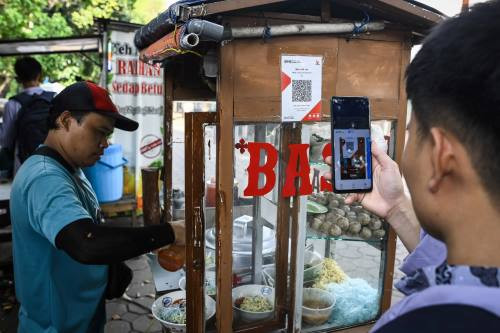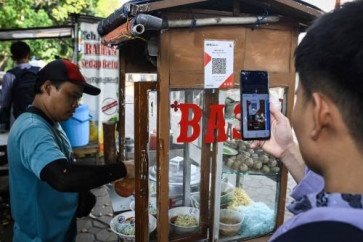Popular Reads
Top Results
Can't find what you're looking for?
View all search resultsPopular Reads
Top Results
Can't find what you're looking for?
View all search resultsQRIS: A symbol of national sovereignty
The innovative payment method has been pivotal in shaping the country's financial landscape, emphasizing the importance of safeguarding national interests.
Change text size
Gift Premium Articles
to Anyone
Q
uick Response Code Indonesian Standard (QRIS) has emerged as a significant tool in the realm of domestic transactions, illustrating Indonesia's determination to maintain its sovereignty without allowing foreign intervention. This innovative payment method has been pivotal in shaping the country's financial landscape, emphasizing the importance of safeguarding national interests.
Deploying QRIS in domestic transactions serves as a safeguard against foreign interference, ensuring that Indonesia retains control over its economic activities. By embracing this technology, the nation asserts its autonomy and strengthens its financial independence. The adoption of QRIS fosters a sense of national pride, as it represents Indonesia's commitment to self-reliance and resilience in the face of external pressures.
The 2025 National Trade Estimate Report by the Office of the United States Trade Representative (USTR) emphasizes the importance of safeguarding domestic payment systems from foreign influence. QRIS plays an essential role in this aspect by enabling secure and efficient transactions while preserving Indonesia's economic sovereignty. By adhering to QRIS standards, the country mitigates risks associated with external intervention and strengthens its position in the global economy.
In the USTR report, US payment companies express concerns regarding the QRIS policy by Bank Indonesia. They feel that during the QR code policymaking process by Bank Indonesia, international stakeholders were not informed about potential changes and were not given the opportunity to express their views on the system, including how the system could be designed to interact seamlessly with existing payment systems.
The USTR report mentions that US payment companies are worried that this new policy will limit access to the use of electronic payment options in the US. Based on Bank Indonesia's data, there are essentially no issues with the use of US payment systems such as Visa and Mastercard because they still dominate the payment systems in Indonesia.
The value of transactions using QRIS was Rp 82 trillion (US$4.9 billion) as of December 2024, significantly lower than transactions using ATMs amounting to Rp 665.9 trillion, where ATMs in Indonesia are still controlled by Visa and Mastercard networks.
Drawing lessons from nations such as China and India, which have strategically insulated their payment systems from foreign actors, Indonesia stands as a beacon of financial independence.



















